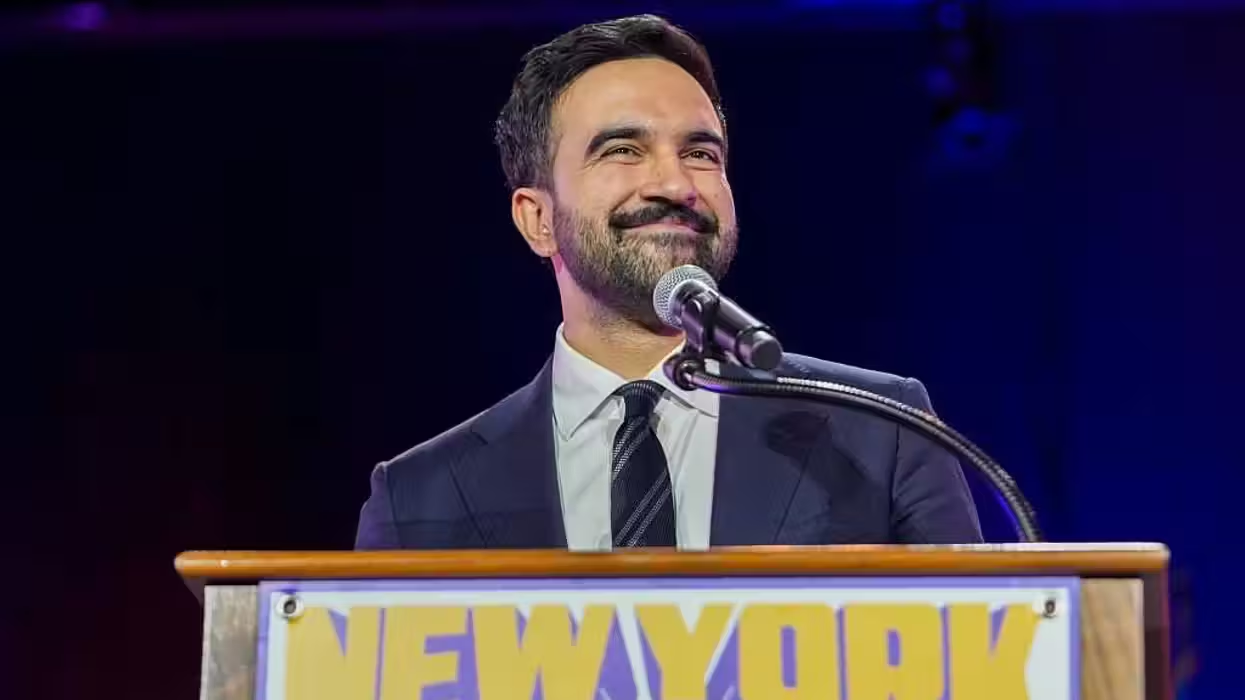
Photo by View Press/Getty Images

Zohran Mamdani’s ‘free stuff’ campaign masks a deeper crusade — to replace American tolerance with forced submission.
If the polls are right, New York City is about to elect Zohran Mamdani as its next mayor. An avowed socialist, he’s riding a wave of “free stuff” politics to victory. Mamdani also describes himself as a proud Muslim who says his faith will no longer “hide in the shadows” of American life.
It’s hard to know what he means. Mosques exist in every major city. Muslims worship freely under the same First Amendment protections as everyone else. What Mamdani seems to want isn’t tolerance but cultural submission — not coexistence, but acceptance. To dissent from his worldview, he insists, is “Islamophobia.”
The choice remains what it has always been: guilt or grace, grievance or truth.
That accusation follows the left’s familiar playbook: disagreement equals bigotry. Americans, however, don’t need to fear Islam to reject its false claims about reality.
Recently, Mamdani told a story — sometimes about an aunt, sometimes about a cousin — who supposedly stopped riding the subway after 9/11 out of fear. The details change, but the purpose doesn’t: to draw sympathy and votes through emotional appeal.
We’re meant to respond, “How cruel Americans are!” The fact that this narrative works says something profound about the collapse of moral imagination among American voters.
“Never forget,” New York once vowed. Now the city seems to say, “We forgot — remind us again, and where’s our free handout?”
After a terrorist attack that killed more than 3,000 people — planned and carried out by Islamic extremists targeting symbols of American capitalism — one might expect some soul-searching. Shame could have led to repentance, reflection, or even conversion. Instead, Mamdani invites Americans to feel guilty for making a Muslim feel uncomfortable after 9/11. The villain becomes America itself.
This is textbook DARVO — deny, attack, and reverse victim and offender. It’s the same intersectional ideology that now dominates universities and city halls. Mamdani’s campaign is its political expression: Islam as the newest “oppressed” identity, ready to claim power in the name of liberation from “whiteness.”
Christians, by contrast, are told to feel shame constantly. From kindergarten to college, they are lectured about crusades, inquisitions, and colonialism — most of them centuries past, all of them endlessly exaggerated. Professors call it “deconstruction.” The goal is to make young Christians feel guilty enough to abandon their faith.
So shame is permitted and even celebrated — but only when it weakens Christianity. The moment it might challenge Islam, it becomes taboo.
Why? Because the modern left keeps a hierarchy of sacred victims. In that moral pecking order, Islam isn’t a religion but a protected identity, immune from criticism. That’s why progressives can champion Islam while rejecting Christianity, even though no Islamic society on earth practices the liberal values the left claims to cherish.
The contradiction is glaring, but ideology blinds them. The left despises both Christianity and capitalism, so a Muslim socialist like Mamdani suits prgressive purposes perfectly.
Religion isn’t like ice cream. You can enjoy multiple flavors of dessert, but not multiple visions of truth or multiple gods. Religions offer rival accounts of reality: who God is, what man is, and what the good life requires.
Christianity teaches that Jesus Christ is the eternal Son of God whose atoning sacrifice restores sinners to communion with their Creator. Islam denies that. It teaches that Jesus was only a prophet and that salvation comes through works — keeping the Five Pillars — without assurance of grace.
In the Gospel of John, “In the beginning was the Word, and the Word was with God, and the Word was God.” Islam’s Quran insists that Jesus was merely a messenger. Yet Islam also claims that the Quran itself is eternal and uncreated — the word of God manifested in a book, not a person. Christians believe the Word became flesh. Muslims revere a text instead.
Even the Quran, in 5:68, tells Muslims to uphold the Torah and the gospel. But those very texts affirm Christ’s divinity and the atonement — the truths Islam rejects. This “Islamic dilemma” reveals the irreconcilable divide between the two faiths.
A society built on Islam will not resemble one shaped by Christianity. The two produce fundamentally different understandings of law, grace, family, and freedom — and therefore of government itself. Mamdani has already made clear that his Islamic convictions will shape how he governs.
RELATED: Evil never announces itself — it seduces the hearts of the blind

In “Healing the Open Wounds of Islam,” Vishal Mangalwadi reminds readers that it was Christianity — not secular philosophy — that transformed Europe from barbarism to liberty. Only the Bible’s message of redemption through Christ can do the same today.
This is a moment for American Christians to recover moral clarity and preach the gospel boldly to Muslim neighbors. Only biblical truth, not multicultural sentimentality, can sustain freedom.
So let’s return to Mamdani’s changing subway story — the aunt, or cousin, or whoever she was supposed to be. Shame can serve a noble purpose when it leads to repentance. After 9/11, the right response to evil wasn’t self-pity but the words of Christ:
“Come to me, all who labor and are heavy laden, and I will give you rest.
Take my yoke upon you, and learn from me, for I am gentle and lowly in heart,
and you will find rest for your souls.
For my yoke is easy, and my burden is light.” (Matthew 11:28-30)
The choice remains what it has always been: guilt or grace, grievance or truth.
Never forget which one leads to freedom.
Owen Anderson